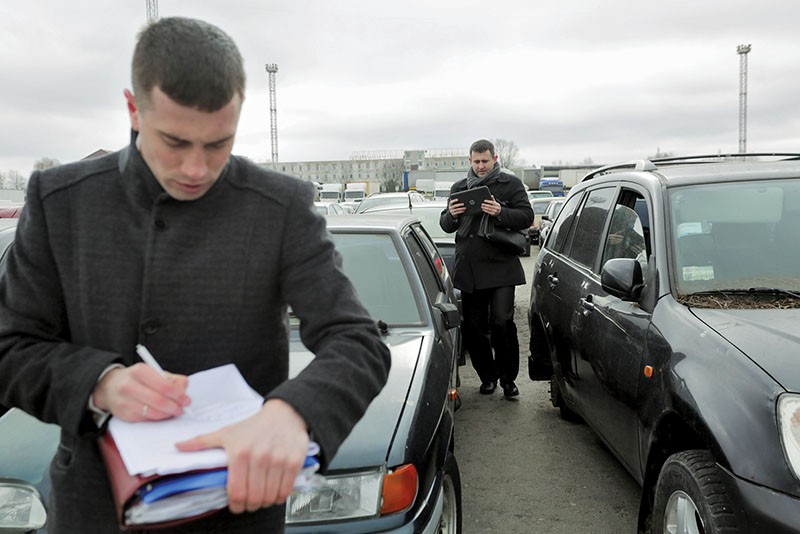Name: Sergiy Shklyar
Position: Deputy Minister for Enforcement at the Ministry of Justice
Key Point: Private executors will dramatically increase enforcement of court decisions
Three years ago, a mere 5 percent of court orders in Ukraine were enforced. Even if the judiciary were completely cleansed of corruption, it would be of little help if their orders were not enforced.
But Sergiy Shklyar, the deputy minister for enforcement at Ukraine’s Ministry of Justice, says there’s already been improvement since he took office, citing a new figure of about one-third fulfillment.
The 43-year-old lawyer has spent the last few years pushing to remake Ukraine’s court executor service into a professional institution that can serve the interests of justice.
To do this, Shklyar is creating a market for debt enforcement.
The market has huge potential: Shklyar said that once the system is fully implemented, up to Hr 310 billion ($11.5 billion) in debt enforcement will be available for private executors. Since the executors will work for a percentage of the retrieved debt, they have an interest in collecting on huge unpaid loans.
There are around 5,500 executors currently employed by the Ukrainian government. The first three groups of private executors, 70 in each group, are currently in training.
Mixed system
Shklyar entered government in March 2015 after directing the Arzinger law firm for 12 years.
Since joining the government, he has shepherded the creation of a private executor service from the legislative drawing board in the Rada to its ongoing implementation.
Neighboring Poland and Bulgaria have both put private executor systems into place, with positive results. Bulgaria employs around 225 private and 250 state executors, with the private executors taking a total of around 200,000 separate cases a year, Shklyar said.
Ukraine chose Bulgaria’s system as a model for its own.
The parliament passed two laws in June as part of a Western-backed overhaul of the judiciary, aimed at reducing corruption in the system while adding accountability and oversight to Ukraine’s courts.
As part of the package, the Rada approved two laws on creating a corps of private executors.
These new contractors will be hired by businesses and private individuals in debt disputes to fulfill court orders. They are to be trained by the Justice Ministry, and empowered under the law to be able to seize property, with “personal liability” for their actions.
The idea is that the Justice Ministry creates a market for the enforcement of debt-related court decisions, with businesses and private citizens being able to hire the best executor based on their record of enforcement. The enforcement of other court orders, including evicting residents who can’t pay their rent and moving children from parent to parent, will remain under the jurisdiction of the State Executor Service.
“We’re trying to create a mixed system,” Shklyar said.
Unlike private debt collectors, the private executors have the legal authority to seize property. Shklyar added that they will also be able to bring police officers along with them to enforce rulings.
The executors will be able to enforce the repayment of larger debts as they gain experience. The first year, they will be limited to individual contracts of up to Hr 6 million ($223,000); the second year, Hr 20 million ($740,000). The payment restrictions expire after the third year.
The government will also regulate the service until they establish their own professional association.

Sergey Makarenko (R) and Anatoliy Televskiy, state executors in Kyiv, register cars in March. Ukraine is in the early stages of having a private executor service. The first batches of executors are in training and set to execute their first orders by mid-May. (Anastasia Vlasova)
Market manipulation?
If the possibility of unleashing a free market on the justice system sounds worrying, Skhlyar offers a salve: independence.
“They have a very good financial motivation,” he said. “From a financial perspective, private executors will be interested in working on large debts at the beginning, while the market is not saturated.”
But many of Ukraine’s biggest debtors are so-called “politically connected individuals.” It is an open secret in Kyiv that people’s deputies are also the country’s largest deadbeats, owing millions in unpaid loans (often insider) to banks.
Shklyar argued that private collectors will be allegiant to the market, making them “more effective” in politically sensitive cases.
“He is not incentivized in any wrong way – he has the proper motivation, so it’s impossible to influence him,” Shklyar said. “He’s an independent individual.”
The system is gearing up for action. Shklyar expects the first “orders” to occur at some point between mid-April and mid-May.
“I think we’ll see a good result within a couple of years,” he said.
